Results of survey carried out by Caucasus Times in Karachay-CherkessiaThe results testify to, i.a., a high degree of dissatisfaction of the population concerning the republic's leadership, a pessimistic mood with regard to the republic's future and a high degree of tension in society at large.
(Caucasus Times) - On August 10-17 2005, Caucasus Times conducted a lightning survey of 200 residents (100 women and 100 men) of the town of Cherkessk, the capital of the Karachay-Cherkess Republic. The age of the respondents was from 16 to 65.
The results of the survey testify to a high degree of dissatisfaction of the population concerning the republic's leadership, a pessimistic mood with regard to the republic's future, a high degree of tension in society at large and, as a consequence, the readiness of a substantial part of the population of Karachay-Cherkessia to participate in anti-government actions.
Thus, the majority of those questioned - 84% - see the most acute problem of Karachay-Cherkessia as being in the region of social and economic issues. Moreover, women react more sharply to the social and economic disorder of everyday life (90 women, compared to 78 men). A substantial part of the respondents - 71% - saw the most acute problem as lying in the sphere of public safety (criminality, terrorism). In the course of the survey it came to light that an equally significant problem for all categories of population of the KChR is in the field of inter-ethnic relations - 27% (24 women and 30 men). And only 2% of respondents consider the sphere of religious interrelation an element of possible conflict. 2% of those questioned consider corruption and instability of authority as the hottest problem of society.
The prospects for the development of the situation in Karachay-Cherkessia receive an extremely pessimistic assessment from the republic's population. Thus, 61% of respondents noted that the situation in the republic in the near future will not change substantially (70 women even 52 men). 27% of those questioned (22 women and 32 men) consider that the position will only deteriorate, and only 6% have an optimistic assessment of the situation. 6% of respondents have difficulty in answering the questions.
The attitude of the residents of Karachay-Cherkessia towards the replacement of elections for regional leaders with appointment by the Kremlin bears witness to the high degree of the dissatisfaction of population with the republic's leadership. An overwhelming majority of those questioned - 65% - expressed confidence that the replacement of elections for regional leaders with appointment by the Kremlin qualitatively stabilizes the situation in the republic. Moreover, women are more optimistic in their forecast - 74 women to 56 men. A less significant percentage of those questioned - 29% - (20 women and 34 men) consider that the innovations of the Kremlin will lead to a redoubling of the existing problems. And only 6% of respondents had difficulty in answering.
The survey revealed a high degree of tension in society, and in consequence – a readiness of a substantial part of the population of Karachay-Cherkessia to participate in anti-government actions.
Thus, in response to a question about whether the respondents are willing to participate in anti-government actions in the case of an increase in their dissatisfaction with authority, the answers were distributed as follows: "yes" - 21% (14 women and 28 men), "probably yes" - 14% (10+18); "probably no" - 25% (32+18); "no" - 28% (26+30); "don't know" - 12% (18+6).
The main sources of information about current events for the majority of the population of Karachay-Cherkessia is television - 87 % of those questioned, which according to the results of previous studies is characteristic for the overwhelming majority of the regions of the North Caucasus. Moreover, the respondents simultaneously view several channels – ORT, RTR, NTV, Ren-TV, less frequently - TNT, STS, Kultura, TVC. The greatest number of viewers among the television channels watch NTV and ORT - 56%. 48% of respondents give preference to RTR They are followed by Ren-TV - 9%, TVC 6%, TNT 5%, EuroNews 5%, STS 2%, "Kultura" 1%.. And 2% of respondents said that they obtained information from all channels. NTV enjoys the greatest degree of trust - 44% of respondents, followed by ORT - 34%, RTR - 27%, Ren-TV 8%, TVC 4%, TNT 2%, "Kultura" 1%. It is noteworthy that the European television channel EuroNews is trusted by all those who watch it - 5%.
As the survey showed, print media are a secondary information source for the residents of KChR - 47% of those questioned. The first place on the scale of popularity is shared by Rossiyskaya gazeta, the newspaper Izvestiya and Argumenty i fakty - 12% of those questioned. Komsomolskaya pravda was preferred by 9% of respondents. One percent took Moskovskie vedomosti, Novaya gazeta, Ekonomika i zhizn, Kommersant and Newsweek. 27% of respondents obtain their orientation only from local newspapers, among which Den respubliki is in most demand. Of the national newspapers the most trusted are Izvestiya - 12% of respondents, Argumenty i fakty - 10%, Rossiyskaya gazeta - 7%, Komsomolskaya pravda - 4%, and Novaya gazeta, Kommersant, and Newsweek – at 1%.
In comparison with other regions of the North Caucasus, an extremely low percentage of the population of Karachayevo-Cherkesia places much value in radio and the Internet as primary sources of information. Thus, only 7% of respondents learn about current events through radio stations and only 2% of those questioned use the information services of the Internet.
Moreover, the information sources are in both cases very limited. In the case of the Internet - they are the news resources of the Russian search systems yandex.ru and rambler.ru, while radio is represented by "Mayak", "Rossiya" and "Russkiy radio". The degree of trust in the above-mentioned radio stations and Internet resources is not very great, and and comprises only 4%.
Note: This survey was conducted within the framework of a 12- month study project called "Public Opinion in the North Caucasus", which is being carried out in all the North-Caucasian republics with the financial support of the American foundation NED. The distribution of replies to the questions of the survey is given in percentages. Statistical error in surveys of this kind is within the range of 7 %. Two versions of a reply were allowed for some of the questions. Participants in the survey were mainly representatives of the intelligentsia, students, employees, workers and pensioners - members of the different ethnic groups that constitute the population of Karachay-Cherkessia (Abazins, Karachays, Nogays, Russians, Circassians).
Charts (answers are in per cent):
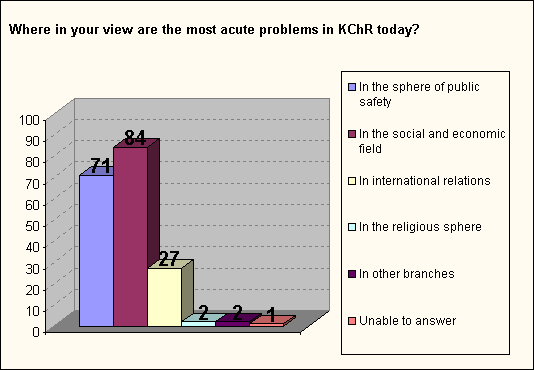
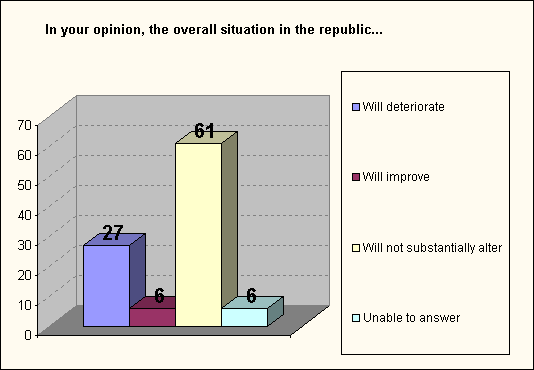
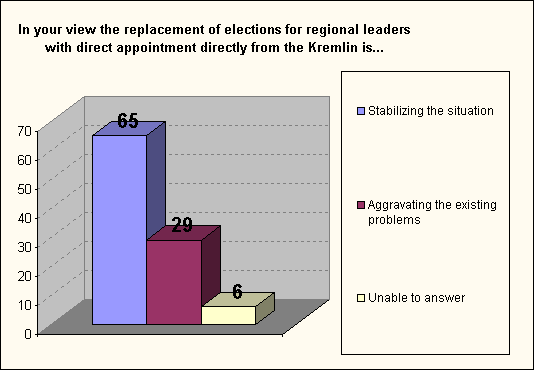
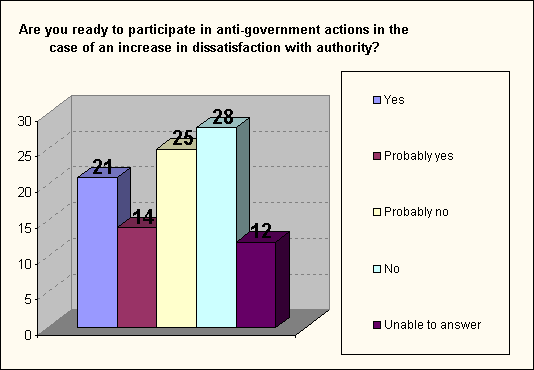
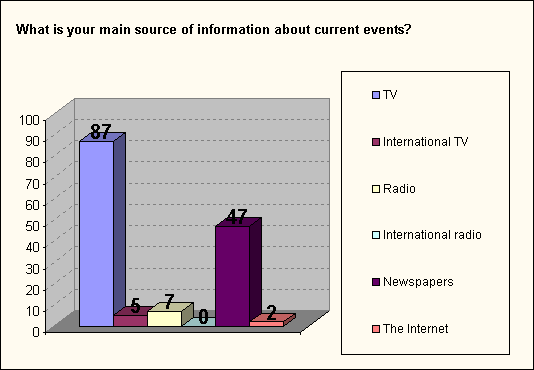
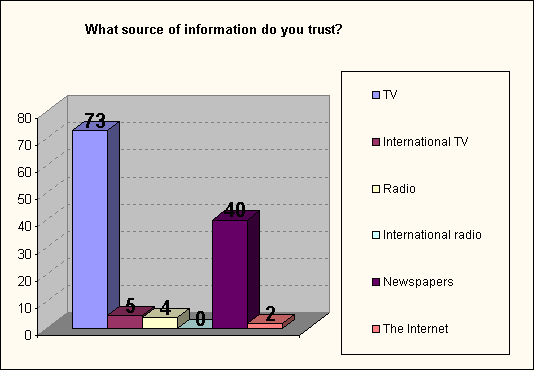
Translated by David McDuff.
(MD/T,A,B)
DISCUSSION FORUM
|

